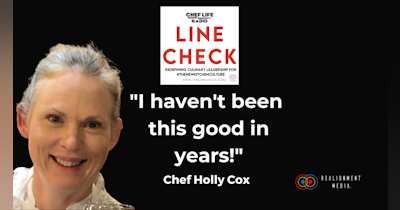“You know, you’re the only chef I’ve worked for that I didn’t want to burn down and take his place,” my sous chef said quietly, head down as we both cut fish.
I didn’t say a word in response. I just kept slicing slabs of tuna.
It took a while for this to sink in.
I had hired him three months prior, against my better judgement. I say “better judgement,” but if truth be told, I was scared of him. He had come to the restaurant after several high profile stints in Colorado, including owning his own restaurant. When he had come in for his interview, I tried to hide my surprise that someone so talented would be applying to be my sous chef — he could have easily been the chef with all of his street cred.
Would my position be secure with him at my back? Would everyone see that he was so much better than me? Would I end up outside looking in? Was there, in fact, anything to teach him?
Turns out that we had very different skill sets and they complimented each other quite well. I had come up through the streets, and he had worked three separate formal apprenticeships with European chefs. What he didn’t know how to do, like expedite 300 early birds without crashing and burning, I could show him. Whatever I didn’t know, he was willing to teach me.
The willingness on both our parts, I came to find out later, was a precious and rare commodity in this field. Other chefs I subsequently met would jealously hold on to their knowledge, their alchemical power masquerading as job security. In time we both moved on, but we kept in touch and shared notes.
While we shared our individual experiences mentoring people and managing operations for us to both grow professionally, other crew members would keep their aspirations to themselves, silently stew in anger while constantly looking for advancement elsewhere, or play on each other’s weaknesses to force a crew member out. These strategies have been tried, and some even worked, but not for very long. They’re not wrong — they were just the way things were done back in the day, but the reality is these are all distractions from what could be.
I’ve written extensively about how we, as culinary leaders, are now being called to a higher standard of governance: more than training, instruction and preparation, today’s culinary crew members are looking for inspiration, mentorship, partnership, and connection to not only the mission, but those shaping that vision. I am suggesting a different way to climb up the culinary ladder. How?
I’ve written extensively about how we, as culinary leaders, are now being called to a higher standard of governance: more than training, instruction and preparation, today’s culinary crew members are looking for inspiration, mentorship, partnership, and connection to not only the mission, but those shaping that vision.
1. Discover your “WHY?”
I’m asking right here, right now: “Why are doing this? What do you hope to achieve as a professional and a person?”
If it’s an answer such as “I want to be successful,” “I want my own restaurant,” or ‘I wanna be famous,” I’m going to be straight up and tell you that you might want to consider another career field.
To put it bluntly, you face too many obstacles to your imagined success, and if your “WHY” doesn’t make you boldly fierce, emotionally strong, and elastically resilient, then you are not going to have enough gas in your tank to make it all the way down the road. Your “WHY” becomes your mission. The closer you are aligned to your mission, the more success and joy you’re likely to encounter on the way.
Your mission must sustain and nurture you in the coming years. It must be abut something bigger than yourself. It could be family, community, convicted felons, mental health awareness, or the environment. Being in service to something other than your own vanity and ambition will be the only way that you’ll be able to sustain true success over the long haul.
When you wake up on Monday morning, beat-up, achy and feeling older than your years after an ass-kicking weekend, your ‘”WHY” is going to be the difference between surviving the next shift or thriving in your life.

2. Look for a mentor, not a job.
It’s easy to fall prey to the economics of one’s situation, after all, we have bills to pay. It’s just as easy to collapse it all into the trap of money earned for time worked, but this is your career we’re talking about. It won’t take much time at all before “being about the grind” will end in burnout, disillusionment, regret, and bitterness.
Instead, consider that mentorship is a lifelong relationship. You can bring all kinds of mad skills to the job as an initiate, but the one thing that you will be missing is maturity. That shouldn’t come as a shock. We were all young once. A great mentor relationship can be the difference between career success or a train wreck of a resume. Maturity can only be modeled for you by someone who is as focused on your success and well-being as you. Once modeled, you can then start practicing your own version of mature professionalism.
When at all possible, and everything is equal, look for a chef who acts as a mentor to his current crew. How do you know? Ask his crew, “Hey I’m thinking of working here and wanted to ask you, how is the chef?” You’ll get a wealth of information to make your decision. Some chefs you’ll be able to recognize by name and then check out their social media accounts or LinkedIn profiles. Look for articles they’ve written, memes that they’ve shared out, and philosophies that they endorse as a way of finding out where they stand on issues you care about.
Like anything in this craft, do your homework and don’t just settle for a paycheck.
3. Be enthusiastically coachable.
Now that you’ve discovered your “WHY” and you’ve made your choice of mentor, it’s time to give yourself over to the process by being coachable. That means giving up having it all handled. Be inquisitive without prejudice to what you think you already know. If you think that you already know, then no one can be in contribution to you.
Be willing to look bad, to admit that you don’t know, and most of all, be willing to ask lots of questions. Then take the time to listen without making it mean anything about you. This is, after all, just business and we all need the wisdom to take what’s being offered by our mentors, regardless if it feels good or not to our egos.
You probably didn’t get hired because of your skill set. Right now no one expects you to know much of anything, but what they are counting on is your attitude. Be unflappable, enthusiastic, eager to test the limits of your knowledge and cheerful in the face what you still have to learn.

4. Taking your time is not a crime.
It would seem that today some culinarians come into the field with an expectation of instant recognition for their genius and subsequent reward for said virtuosity. If it was only and ever about skill, then that would be a reasonable expectation, but it’s not. It’s more about longevity, stability, and maturity, as we pointed out above. Those attributes can only be gained through practice, patience, and time served.
The fiery crucible of the kitchen will test the mettle of everyone, and either your resolve will come through annealed like the strongest alloy, or you’ll end up slag.
Take the time to master the small things, layering skills upon previously learned ones. Harold McGhee’s On Food & Cooking is an excellent reference to begin to understand chemically, spiritually, and emotionally why certain foods do what they do, when they do it, and how to bend the natural laws with grace and consistency.
Mastery can only be achieved by practice. Afford yourself the luxury of taking the time to practice daily the skills that will last you a lifetime.
5. Speak as to be understood.
If you’re like me, you’d rather work hard then play workplace politics. The trouble is if you keep your nose to the grindstone, no one can hear you speak. And you need to be heard.
For someone like me, I’ve heard the internal dialogue so many times in my head that I make the mistake of thinking that I’ve already spoken my truth out loud. It’s a convenient way for me to hold other people in judgement when they don’t get just how awesome I am.
If you never speak up, then how is anyone supposed to get what you’re going through, what your expectations of workplace recognition are, or what your chances of advancement might be?
I’m not suggesting that you throw your apron down on the chef’s desk and make demands. What I am suggesting is that before you get hired or accept employment, have a frank conversation about where you see yourself on your path, how you believe this position will contribute to your growth, and ask to co-create a plan with your chef-mentor of how you’re going to get there.
The operative word is “co-create.” There is give-and-take in the process, and no matter how clear you are about what you want to get out of this opportunity, chances are that it’ll end up being something completely different in the end; potentially of equal value but surprising nonetheless. Hold it all loosely but be responsible for your experience.
It’s probably important to add that no matter how you’re feeling about what’s going on in your workplace or your position, it is always more powerful to seek understanding than to be understood. Be cautious of overstating your position or expectations to the exclusion of all else. Instead, be the bridge towards mutual understanding. It costs nothing to be kind, considerate, and professional and the value to your reputation will increase over time.

6. Look to create more value than you are paid.
Allow me to paraphrase the inspirational speaker Tony Robbins. The first time he went to see a presentation by the man who would become his personal mentor, Jim Rhone, he stayed after to ask him a particular question. Tony wanted to know how he could make his dream come true of financial abundance and Jim was quick to answer, “You have to give more value than you receive. The more people you assist in reaching their goals, the quicker you’ll get to yours.”
If you’re only getting paid $15 an hour, do you do just enough to earn that rate or are you willing to create more value than you’re currently being paid?
Recognition, accolades, promotions, and more pay will only come when you release your attachment to them and lean in completely where you’re at right now. The more you’re able to redirect your desires for personal achievement towards the collective good, the better your chances at being recognized for the contribution you’re being.
7. Assume the role you’re aspiring for.
It may be self-evident, but it’s often overlooked. The best time to ask for a raise or promotion is when you’re already doing the job. Want the sous chef job? Then do the sous chef work. Looking for a promotion to pastry supervisor? It’s going to be pretty hard for the chef not to give it to you when you’ve already doing the job consistently and well.
Don’t let a title or promotion stop you from leaning in, learning more, and creating more value than you earn while you patiently, consistently, and passionately climb the culinary career ladder.
One last point on this subject. You can have it all and still feel empty. Do yourself a favor and cultivate an attitude of gratitude now. That way, no matter where you’re at on your journey, you’ll appreciate what you have and think less about what you don’t and, consequently, what that may or not mean about you.
Make it a daily ritual to take time and appreciate your journey — it’s unlike anyone else’s. Every day there’s something or someone to be grateful for. Granted, it might be easier to find some days more than others.
And that sous chef from 25 years ago? We’re still best friends and work on projects together often. Our relationship has been one the greatest gift of my life and something I wish for you all on your climb up the culinary ladder.
Previously Published @
The post 7 Steps to Moving Up the Culinary Ladder appeared first on foodwerks inc.





